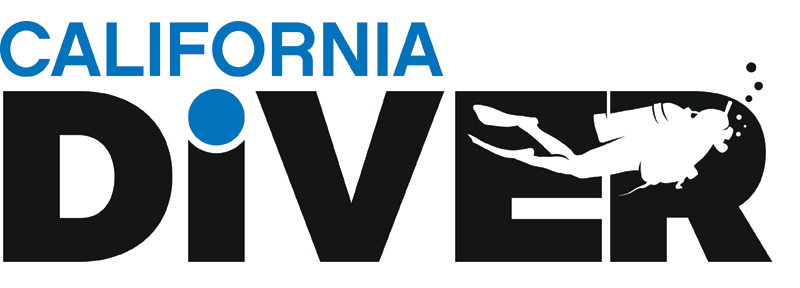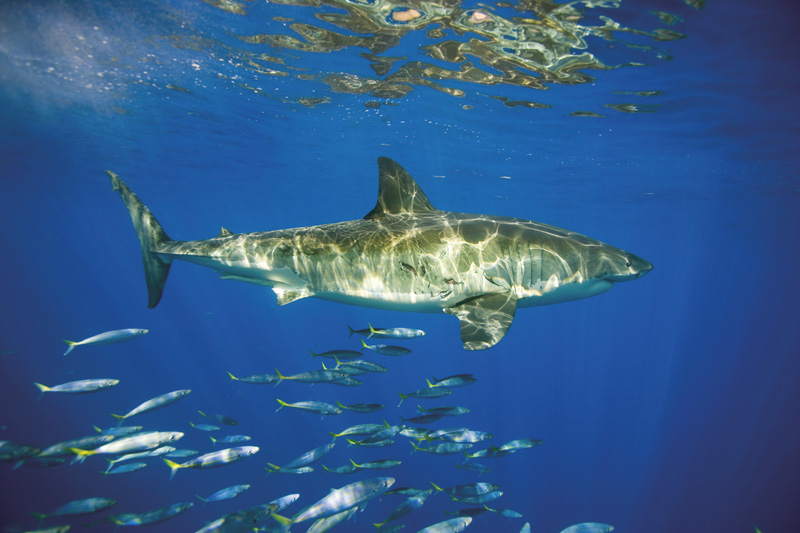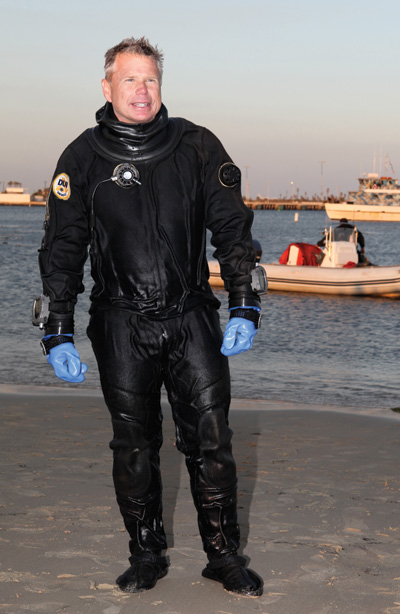I love sharks the way most people love their dogs and cats. To me there is nothing more majestic and beautiful than a big shark swimming gracefully through the water. I’ve played a game of “fetch” with a 900-pound female tiger shark named Emma – a sweet creature that has never showed any aggression to me despite my vulnerabilities underwater. Countless times I have hand-fed sharks bigger than me and pet them, inverted them into tonic immobility, and gently released them.
My favorite shark is a great white shark named Spots. Her massive 3,500lb body reaches over sixteen feet in length, making her look ominous, but she has always been wonderfully calm and inviting. Over the years I have come to know her personally, and two years ago I had the rare chance to swim along side her while holding her huge dorsal fin. She was a perfect lady… never making me feel threatened. As I rode alongside her for the camera, she calmly watched me and swam slow enough for me to cruise next to her for nearly two minutes. I will remember those two minutes for the rest of my life.
I love Emma and Spots and many other sharks. I know them as individuals, and I miss them between trips. Over the last two years I have loved my memories of Spots and told her story at dozens of speeches.
My love for the sea and for sharks has led me down a path of being a warrior to protect them best I can. For fifteen years I have covertly hunted poachers who illegally or unethically murder sharks, sea turtles, dolphin, porpoise, and endangered fish (such as the totuaba). I’ve filmed the poachers in the act… often at great personal risk and almost always alone.
With all the killing taking place, my heart hurts but I’ve managed to be calm enough to continue to gather images of the cowards killing these defenseless animals so I could get them prosecuted and imprisoned. Often I wouldsneak out in the sea at night and collect the poachers’ nets, long-lines, and traps and drag them to shore and burn them.
What are your thoughts on this? Talk about it in our Discussion Forum!
Over the last five years I have worked with a few other people and I have tried to sell my poacher hunting missions…dubbed “rECOn”…as a television series. It is important work and, at the same time, a very expensive and time-consuming process. It takes money to do rECOn missions and I hoped a TV series would help pay for some of it, which would increase my range and effectiveness. Most of my missions, however, are still done solo and paid for out of my own pocket, and from my interest and passion for saving as many of these animals as I can.
I recently heard that eleven of my friends were murdered in Baja. Eleven great white sharks that I have known personally for years as individuals and filmed for several shows off Guadalupe Island, were caught and killed for their fins and jaws. Some were dragged ashore on my favorite beach in Loreto before being cut apart and having their fins removed.
My heart was crushed when I looked at the picture of one of the dead white sharks with people rejoicing in the background and thought I recognized my friend…Spots. The people who film and study these beautiful sharks know them well. Their faces, their scars, their coloring and size make them unique and recognizable, which leads to them getting special names. Spots was, as you may have guessed, named for the unique spot pattern on her body. From my view of the picture online, I feel certain it was her that was killed and dragged onto the beach.
Now, her body rots in the surf line without her fins (the same fins I lovingly held on to two years earlier). Her massive fins have been sent to China for a senselessly fashionable & tasteless soup. Her murderers were paid and will kill again many, many more times… just to get a few dollars. I feel just as I did when my friend died in military combat in front of me. I know I am an effective warrior and very capable, but my friend(s) have died nonetheless.
This morning, I am sitting next to a beautiful aquarium at the Silverton Casino in Las Vegas… watching sharks and rays cruise by without concern. I feel I have failed them all.
Hunting poachers, polluters and eco-terrorists (PPETs) is costly and very dangerous. Sharks, dolphin, sea turtles and fish have behavior patterns that can be easily predicted and exploited. Catching and killing these animals is easy. With intelligent people applying their money-motivated energies, new technologies have arisen to make the murderous slaughter of these inoffensive creatures even more deadly efficient. Killing the innocent for financial or political gain is found in genocide, robbery, and fratricide just to name a few.
Unfortunately, most television networks are more interested in showing wholesale slaughter on the open seas than showing the opposite – conservation and mindful protection of the earth’s limited resources. What part of… “If the oceans die… so does all mankind” … does Animal Planet, Discovery Channel, Outdoor, and National Geographic not understand?
A conservationist (which I am proud to be called) is often unfunded, unpaid, often considered a radical ‘tree-hugger’, has little social support, not insured, and is fighting against organized groups alone (or nearly alone). Nonetheless I intend to dedicate much more time and energy to stopping this mindless cruelty and globally unsupportable ignorance (or arrogance)-based slaughter.
I now have several generous sponsors who are stepping up to the plate with donations of equipment and time to support my Undersea Voyager Project and future rECOn missions. My major sponsor, Luminox, is donating some of the proceeds of every Scott Cassell Limited Edition Undersea Voyager Project Watch to this work. Every dollar has more power now than ever before so every donation is appreciated.
Not everyone can do this work, and not everyone would want to. It is challenging in every possible way. But everyone can help with their own gifts and talents.
Being with Spots for those two minutes was a glimpse into her world…and it was vast, beautiful yet fragile. Those precious moments were possibly the most spiritual of my life. I will remember her…and I will miss her.
About Scott Cassell
An ocean pioneer, Capt. Scott Cassell has accumulated over 13,000 hours of dive time since beginning his dive career in 1977. H’s been a commercial diver, an explorer/filmmaker, and a 20-year veteran of closed circuit rebreather technology. He is also an accomplished cave diver with hundreds of hours in the deep caves of the Yucatan peninsula.
A USCG Qualified Submersible Pilot with 900 dives on the SeaMagine SeaMobile, Scott also holds the world record for longest distance traveled by a diver—52 miles in 9.5 hours non-stop. Scott taught at the College of Oceaneering and is one of only ten advanced medical technician instructors in the U.S. He is one of the few civilians to earn the U.S. Navy Diving Supervisor and Dive Medical Technologist ratings, and worked in maritime counter terrorism in high-risk regions of the world.
His film and documentary credits include undersea cameraman and host-presenter for over 20 docs on several networks including Disney, MTV, the Discovery Channel, The Space Channel, Spike TV, Animal Planet, BBC, and the History Channel.
You can contact Scott Cassell by email at scottcassell@live.com.
.


